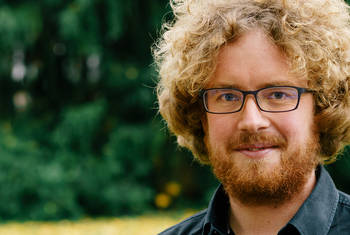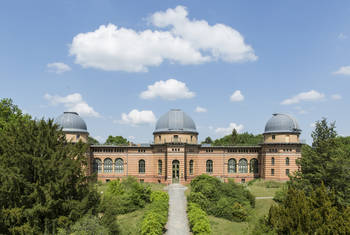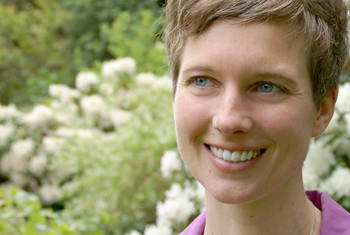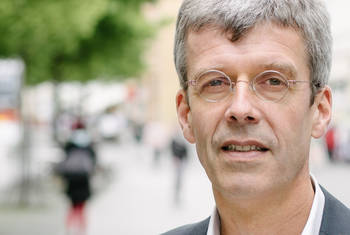Jonathan Donges How Do Climate Change Related Natural Disasters Potentially Increase the Risk of Armed Conflicts?
Jonathan Donges is a postdoctoral researcher at the Potsdam Institute for Climate Impact Research (PIK), Germany, as well as Stordalen Scholar at the Planetary Boundaries Research Lab at the Stockholm Resilience Centre of Stockholm University, Sweden. Furthermore, he co-heads PIK’s flagship project COPAN on Coevolutionary Pathways in the Earth system (www.pik-potsdam.de/copan) which investigates the mid- and long-term coevolution of natural and socio-economic subsystems of the Earth system and its relationship to planetary boundaries. For his PhD thesis on Earth system analysis Donges received the Donald L. Turcotte award for outstanding dissertations in nonlinear geophysics from the American Geophysical Union, the Friedrich-Hirzebruch dissertation award (2nd mention) of the German National Academic Foundation and the Wladimir Peter Köppen Prize of the Cluster of Excellence CliSAP, Hamburg.
Area of Research
Earth System Analysis, Socio-Ecological Systems, Complex Network Dynamics
since 2013
Co‐Head
Potsdam‐Institute for Climate Impact Research (PIK) (more details)
Flagship Project COPAN on Coevolutionary Pathways in the Earth System
since 2013
Joint Post‐Doc
Potsdam‐Institute for Climate Impact Research (PIK) (more details)
Stockholm Resilience Centre, Stockholm University, Sweden
2009-2012
PhD
Humboldt University of Berlin (Humboldt-Universität zu Berlin)
Potsdam‐Institute for Climate Impact Research and Department of Physics
2009
Diploma
University of Potsdam (Universität Potsdam)
2008-2009
Final Year Project
University of Potsdam (Universität Potsdam)
Department of Physics and Astronomy
2006-2007
Year of Study
University of California, San Diego
2005-2009
Graduate Studies of Physics
University of Potsdam (Universität Potsdam)
2003-2005
Undergraduate Studies in Physics
University of Bonn (Rheinische Friedrich-Wilhelms-Universität Bonn)
Prizes
- - Wladimir Peter Köppen Prize, Cluster of Excellence CliSAP, Hamburg (2015)
- - Friedrich‐Hirzebruch Dissertation Award (2nd mention), German National Academic Foundation (2014)
- - Donald L. Turcotte Award for Outstanding Dissertations in Nonlinear Geophysics, American Geophysical Union (2013)
- - PhD Scholarship, German National Academic Foundation (2010-2012)
- - Falling Walls Lab Scholarship, Falling Walls Foundation and A.T. Kearney (2011)
- - Award for Outstanding Graduates in Physics, Physical Society of Berlin and WE‐Heraeus Foundation (2010)
- - Scholarship, Education Abroad Program, University of California (2006-2007)
- - Fulbright Scholarship, German‐American Fulbright Commission (2006-2007)
- - Hölderlin Scholarship, German National Academic Foundation and Siemens Management Consulting (2006-2007)
- - Scholarship, German National Academic Foundation (2005-2009)
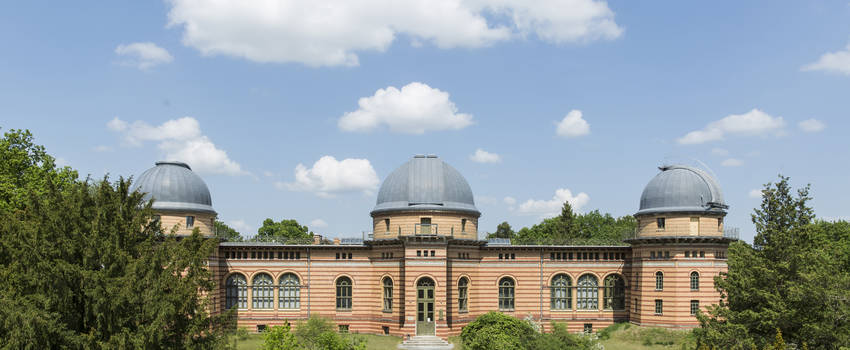

Potsdam‐Institute for Climate Impact Research (PIK)
At the Potsdam Institute for Climate Impact Research (PIK), researchers in the natural and social sciences from all over the world work closely together to study global change and its impacts on ecological, economic and social systems. Researchers examine the earth system's capacity for withstanding human interventions and devise strategies and options for a sustainable development of humankind and nature. Interdisciplinary and solution-oriented approaches are a distinctive characteristic of the institute.
PIK generates fundamental knowledge for sustainable development primarily through data analysis and computer simulations of the dynamic processes in the earth system, but also of social processes. PIK members publish their research findings in international publications and advise policymakers in Germany and abroad. In addition to the Federal Government of Germany, the European Commission and a number of other governments, international organizations like the World Bank also benefit from the institute´s expertise. The historic buildings of the institute and its high-performance computer are located on Potsdam’s Telegrafenberg campus (Source: PIK).
Map
There is an extensive discussion about the connections between climate change related disasters and armed conflicts like civil wars. JONATHAN DONGES explains in this video how the research team looked at this relationship in more detail. Their new approach connects natural disasters with large economic effects, potentially related conflicts as well as the socioeconomic contexts. The findings show that in countries with a high ethnical fractionalization the likelihood of armed conflict related to natural disasters is particularly high. This relationship is surprisingly stronger than all other socioeconomic issues like poverty, inequality or the country’s conflict history. The study also reveals a particularly strong impact of heat waves and droughts on a potential armed conflict. The implications of this research call for a more synchronized approach of climate and security policies.
LT Video Publication DOI: https://doi.org/10.21036/LTPUB10336
Armed-conflict Risks Enhanced by Climate-related Disasters in Ethnically Fractionalized Countries
- Carl-Friedrich Schleussner, Jonathan F. Donges, Reik V. Donner and Hans Joachim Schellnhuber
- Proceedings of the National Academy of Sciences
- Published in 2016


